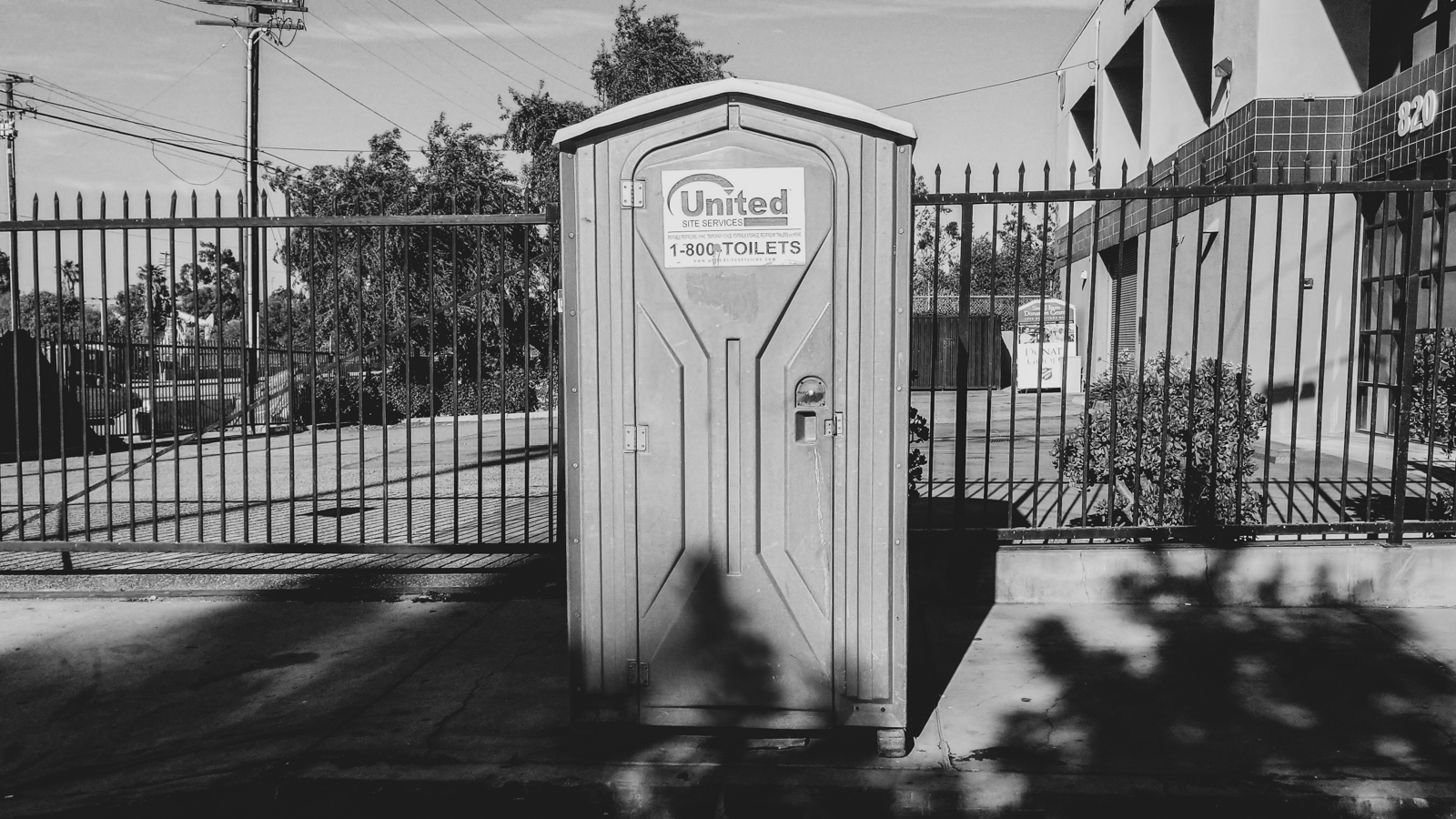[dropcap size=big]M[/dropcap]arch 2021 — While an employee from United Site Services (USS)—one of the country’s largest porta-potty and temporary fence distributors—sanitized a portable hand-washing station on the eastern side of MacArthur Park, across from the Metro station, a disappointed man emerged from a filthy porta-potty maintained by the same company a block north.
When he stepped on the foot pump of a plastic sink to clean his hands, all he heard was air running through the line.
None of the three hand-washing stations next to the four almost unusable portable bathrooms had any water, soap, or paper towels.
According to the employee at the previous station, the stations a block north weren’t on his route that day but he assured us someone else would likely get to them. “They are scheduled for pretty much everyday,” he told us.
After spending about 30 minutes cleaning, the employee jumped back into a giant water truck, heading north on Alvarado Boulevard, passing by the trash-littered bathrooms and dry hand-washing stations, presumably on his way to his next stop.
A few weeks later, in early April of this year, all of the unusable portable toilets and hand-washing stations were removed from the location.
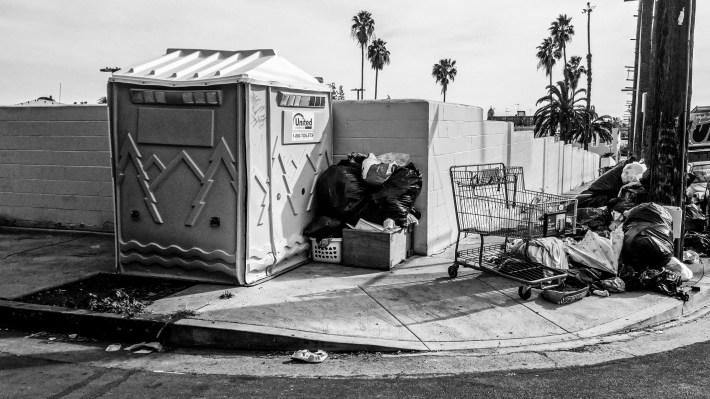
For years activist and unhoused residents have demanded that the city provide basic services like hand-washing stations, bathrooms, and showers to encampments. It wasn’t until the city was in the midst of a global pandemic that some of those services were finally implemented. Nonetheless, many critics felt that it was too little too late.
An L.A. TACO analysis of more than 700 emails and spreadsheets from LASAN found that the city failed to monitor the hundreds of hand-washing stations rolled out to encampments at the onset of the pandemic daily and dozens of stations went days, weeks, and in some cases more than a month without being serviced by vendors.
In four months, the contracts for the remaining hygiene stations will expire and it's unclear if there are any plans to extend the contracts or if the city will establish more permanent solutions.
Meanwhile, hand-washing stations and porta-potties are quietly being pulled off the streets. Since April, the number of hand-washing stations city-wide has declined by more than 20 percent.
Where are the hand-washing stations?
In an industrial area of the West Valley, ash falls from the sky as the Palisades fire burns on the other side of the Santa Monica Mountains. Paul, a 40-year resident of L.A. that was pushed onto the streets a few years ago, stands beside his Dodge camper van on a street where there used to be three hand-washing stations. According to Paul, the units were usually well maintained. They were “never out of paper towels or anything like that,” he told us.
Now the street is down to one hand-washing station.
According to LASAN’s most recent assessment of all hand-washing stations city-wide, in September there were less than five hand-washing stations in CD 12, the council district that Paul lives in. Beyond the street where Paul lives, there are hardly any hand-washing stations in the West Valley. Neighborhoring Northridge and Porter’s Ranch didn’t have a single hand-washing station, according to the sanitation department’s earlier assessment.
Meanwhile, across the street from Paul, in CD 3, the district that Councilmember Bob Blumenfield represents, there were twice as many hand-washing stations in September, even though according to the latest homeless count there are slightly more unhoused residents in CD 12, the council district represented by John Lee.
Councilmember Lee’s office did not respond to multiple requests for comment.
Harrison Wollman, press secretary for Los Angeles Mayor Eric Garcetti’s office said in an email: “The Unified Homeless Response Center (UHRC), which coordinates the distribution of the units, worked with each council office to ensure they were given equal opportunity to determine the number of units and locations in their district. The Department of Public Health (DPH) also provided guidance on a select number of locations they identified as high-priority areas.”
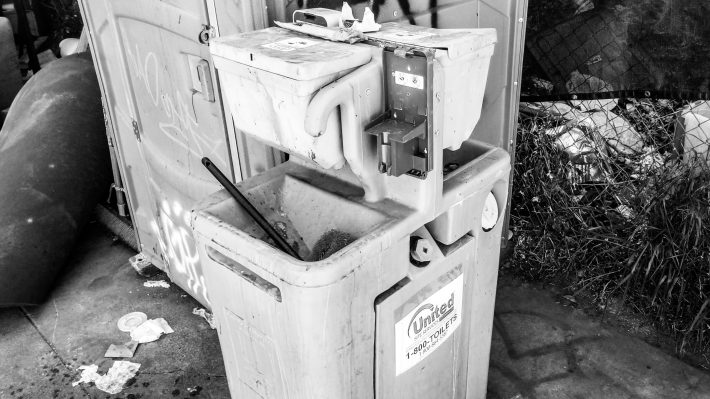
Over the past six months L.A. TACO spoke to more than 15 unhoused residents in the San Fernando Valley. While a few people, like Paul, said that they encountered hand-washing stations that were useful and well maintained, the majority of people brought up concerns about stations being tampered with, units not being serviced regularly and a lack of information about where to find places to wash your hands.
Unhoused residents that live on the invisible lines that divide council districts and cities, like Paul, as well as homeless advocates, expressed frustration over one side of the street being more sufficiently resourced than the other. “I guess they got a better Councilman,” Paul said in reference to there being more hand-washing stations and portable toilets in CD 3.
But for Paul and multiple other unhoused residents that we spoke to, the lack of bathrooms in the area is of even greater concern. “I’d gladly trade one [hand-washing station] for an Andy Gump porta-potty,” Paul told us, referring to one of the vendors that supplies hygiene stations to the city.
An employee with Andy Gump declined to speak to us for this series of stories. “We appreciate you reaching out to us but unfortunately we are unable to discuss our current contract with the City of LA in regards to the handwash (sic) units,” April Bustos said in an email.
United Site Services, the largest provider of portable sinks and toilets to the city did not respond to multiple emails and requests for comment.
For Paul, having three hand-washing stations on one street was more than adequate and he can even make due with just one. For Paul and many other residents that we spoke to, it’s easier to find a way to clean your hands than it is to find a place to go to the bathroom. With a few dollars for instance you can buy a gallon jug of water and a bar of soap or some wipes.
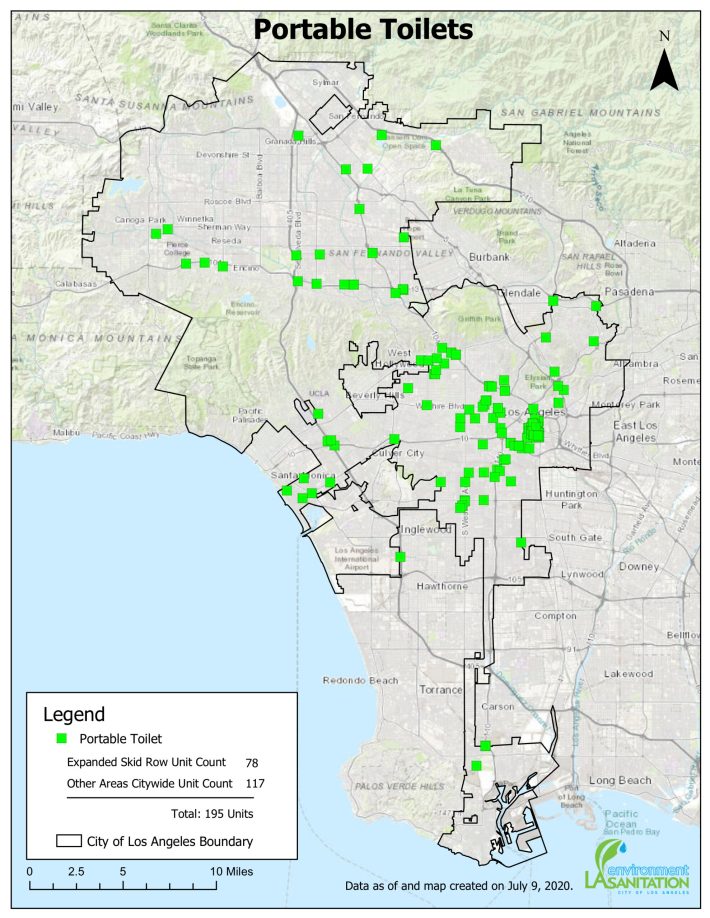
According to an assessment from LASAN of all the porta-potties in the city over the summer, there wasn’t a single portable toilet in Chatsworth where Paul lives. The closest bathroom to Paul is approximately three miles south in Canoga Park.
A resident in Canoga Park told us in January that the bathrooms were a blessing. “Our huge problem was finding a bathroom,” they said.
For Paul and other unhoused residents in the valley, trash pick up is another issue. “Why don’t they clean up the trash?” Paul wondered. According to him and other unhoused residents in Chatsworth, Canoga Park, and Van Nuys that we spoke to, sanitation hasn’t come by in weeks to pick up trash or empty city managed trash cans nearby.
L.A. TACO reached out to the sanitation department for this story last week but did not receive a response to our questions before publishing. We will update when we hear back from them.
Emily and Lawrence, a couple that lives a few streets east from Paul shared similar concerns about bathrooms and trash pick. “They complain about people using the bathroom on the street,” Lawrence said sitting next to Emily, both of them huddled underneath several layers of tarps. As the Palisades fire raged on during the day there was potential for rain in the evening. “I understand the hand sanitizer thing. But why not any bathrooms with them?” Lawrence asked.
At the start of the pandemic, the city rolled out roughly two hundred porta-potties, according to a July 2020 assessment from LASAN. Nearly half of those units went to Skid Row, while more far-flung areas like the West Valley and South Bay, received hardly any. “We use the bathroom, too,” Lawrence says. “And we [would] rather use a porta-potty than use a freakin’ bucket or anything like that.”
Bathroom options in the sprawling region, where encampments are spaced out sometimes by miles, are limited. Lawrence says that businesses are reluctant to let people that they perceive to be unhoused use their restrooms. “It’s stereotyping in a sense because they don't know if we're homeless or not. But when you go in and ask them to use the bathroom they’re like ‘employees only or customers.’”
Like Paul, both Emily and Lawrence also say trash pick up has slowed down. “It used to be every two weeks. Right?” Emily asked Lawrence. “And then it went down to once a month.” After that she says they stopped coming to pick up their trash all together.
According to Lawrence, LASAN comes to empty the trash cans at the bus stop half a block away but not theirs. Fortunately, he’s made an arrangement with one of the employees. “I've talked to one of the trash men, he'll pick up my trash as long as I put it on the corner in a bag. And because he comes through here frequently, and I've talked to him, he'll dump my trash. But it's not his job,” Lawrence says. “He's being nice.”

Down the 110 south freeway, in an industrial area of Harbor City on the opposite side of L.A. County, hand-washing stations are being pulled as unhoused residents deal with relentless sanitation sweeps and alleged harassment from the Los Angeles Police Department (LAPD).
Carlos and Christina said that when they were initially rolled out, hand-washing stations and portable toilets were well maintained, but eventually service dropped off. The closest hand-washing station to them used to be a short walk around the corner. Recently it was removed, several unhoused residents and two organizers that regularly work with the community told us yesterday.
The closest place for them to wash their hands now is at a porta-potty nearly a quarter mile down a dirt road, where big rigs regularly pull in and out of businesses, kicking up dirt that will sting your eyes. On Tuesday afternoon, the toilet was relatively clean but there was no soap in the dispenser and you had to fight with the foot pump just to get a trickle of water to come out.
Christina told us that she’s had issues with maintenance workers barging into the porta-potty while she’s using the restroom. “He opened the door and I grabbed the door to close it. And he yanks it back open again on me.”
“We had to tell one of the workers not to come back, because he did that to me.”
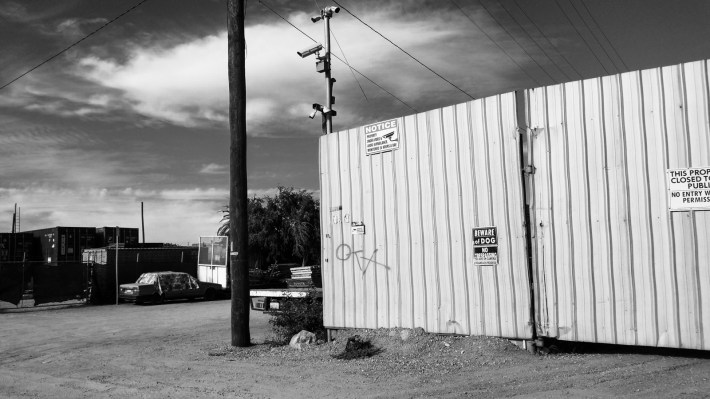
Carlos told us that the greatest hardship he faces is harassment from the LAPD though. “These clean ups that they do supposedly to help people, that’s a new form of evil,” Carlos said referring to the sanitation cleanings that happen every few weeks. Police typically accompany sanitation workers during the “cleanings.”
“What kind of cleanups are scheduled for the day after Thanksgiving, the day after Christmas? The day after New Years,” Carlos asked.
The 35 year old life-long L.A. resident grew up in Wilmington and Compton, not far from where he lives now. Before becoming homeless he worked as a dispatcher for various towing companies and Uhual at one point. Six years ago, Carlos lost his highschool sweetheart to diabetes, shortly after that he became homeless. “Ever since then I can’t really keep my head steady,” he told us yesterday afternoon. “I was engaged and all that, we were going to get married and that never happened.”
“You know they give you that question, ‘how do you see yourself five years from now?’ Who sees this kind of shit lined up for them.”
Down the dirt road, Daniel, an aspiring mechanical engineer, told us that there used to be a hand-washing station next to the bathroom but it was recently removed several weeks ago. He says that for the most part, people get water and heat it up over a fire to clean up. “It's a hassle,” he admits.
Daniel told us that the porta-potty is serviced more regularly. He estimates vendors come once every two days, albeit at odd hours though. “It's pretty consistent. If they do [the bathrooms], they should do the hand-washing stations also though.”
Similarly to where Paul lives in the West Valley, Daniel resides on the border between two different jurisdictions. One side of Lomita Blvd is the City of L.A., the other side is Carson.
On the other side of four lanes of traffic and a divider, there are three hand-washing stations and one portable toilet across from Daniel. Yesterday the hand-washing station was filthy and without soap, water and paper towels. The porta-potties were covered in graffiti and none of them had any sanitizer or sinks. Four unhoused residents in the area said that the bathrooms regularly have issues with maintenance and security.
On the other side of a metal fence behind the completely dry hand-washing station, a sign reads “open to the public all are welcome,” below it a set of rules reminds folks that violations could result in prosecution. A security guard reportedly monitors the units overnight. They’re apparently operated by L.A. County.
According to the city’s assessment of porta-potties last summer, there were only two toilets near where Daniel, Carlos, Christina and dozens of other unhoused residents live, that the city was responsible for. Now there’s only one semi-reliable toilet and hand-washing station.
L.A. TACO reached out to councilmember and mayoral candidate Joe Buscaino’s office this morning but did not hear back from them before publishing. We’ll update this story if we do.
This is the second investigative article that was produced as a project for the USC Annenberg Center for Health Journalism’s 2020 Data Fellowship. Read the first story here as well as the third installment. The Center’s engagement editor, Danielle Fox, contributed to this report.
